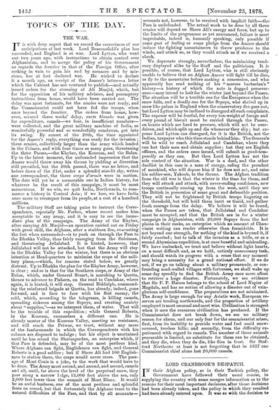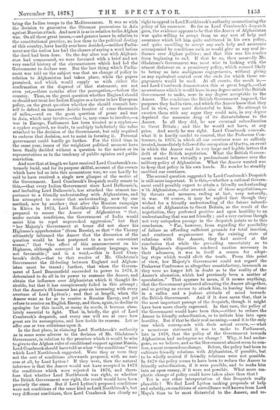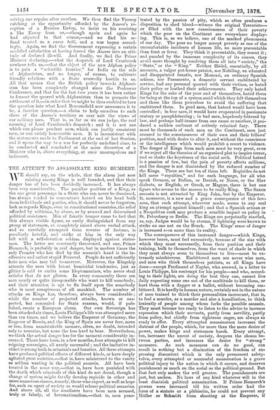LORD CRANBROOK'S DESPATCH.
IN their Afghan policy, as in their Turkish policy, the Government have followed their usual course, in supplying the country with some meagre information as to the reasons for their most important decisions, after those decisions had been already taken, and the policy in which they resulted had been already entered upon. It was so with the decision to Afghanistan had undergone no change ! Why, it had under- gone, as we believe, and as the Government almost seem to con- fess, a most tremendous change. Before, the policy had been to cultivate friendly relations with Afghanistan, if possible, but to be wholly neutral if friendly relations were not possible. cess at all, by Lord Lytton ? If they were, then the natural In 1878 the policy seems to have been to reduce the Ameer to inference is that the Ameer would not have accepted in 1873 friendly subordination, if it were possible, and to make him the conditions which were rejected in 1876, and there- into an open enemy, if it were not possible. What more em- fore that whether Lord Northbrook was right, or whether phatic change of policy could have taken place than that?
the British Government was right, the result would have been Yet is any other interpretation of this Despatch really precisely the same. But if Lord Lytton's proposed conditions plausible ? We find Lord Lytton making proposals of help were not conditions of the same kind as Lord Northbrook's, but and subsidy, on conditions of surveillance well known from Lord very different conditions, then Lord Cranbrook has clearly no bring the Indian troops to the Mediterranean. It was so with the decision to guarantee the Ottoman possessions in Asia against Russian attack. And now it is so in relation to the Afghan war. On all these great issues,—and greater issues in relation to the constitutional practice, no less than to the political destiny of this country, have hardly ever been decided,—neither Parlia- ment nor the nation has had the chance of saying a word before the deed had been done. On the day after war with Afghani- stan had commenced, we were favoured with a brief and not very candid history of the circumstances which had led the Government to declare war. But the last thing which Parlia- ment was told on the subject was that no change of policy in relation to Afghanistan had taken place, while the papers promised, and which would supply us with either the confirmation or the disproof of that statement, are not even yet,—three months after the prorogation,—before the country. Thus, on the great question whether England should or should not treat her Indian Empire as a factor in her European policy, on the great question whether she should commit her- self to defend an immense Asiatic frontier of some thousands of miles,—and on the great question of peace and war in Asia, which may involve,—that is, may come to involve,—a war in Europe, Parliament has been treated as a cypher,— a cypher required, no doubt, to multiply indefinitely the value attached to the decision of the Government, but only required to endorse that decision, not to assist in forming it. Personal government could hardly go farther. For the third time in the same year, issues of the weightiest political moment have been finally decided without a question to the nation or its representatives as to the tendency of public opinion and public conviction.
And now that at length we have received Lord Cranbrook's ex- tremely lucid, and for its purpose skilful, account of the events which have led us into this momentous war, we can hardly be said to have received a single new glimpse of the motive of the Government. Lord Cranbrook's Despatch really comes to this,—tbat every Indian Government since Lord Dalhousie's, and including Lord Dalhousie's, has attached the utmost im- portance to a friendly understanding with Afghanistan, and has attempted to secure that understanding, now by one method, now by another ; that after the Russian campaign in Khiva in 1873, Lord Northbrook's Government was prepared to assure the Ameer of Afghanistan that, under certain conditions, the Government of India would assist him to repel unprovoked aggression," but that " her Majesty's Government at home did not share his Highness's apprehension" (from Russia), so that " the Viceroy ultimately informed the Ameer that the discussion of the question would be best postponed to a more convenient season ;" that " the effect of this announcement on his Highness, although conveyed in conciliatory language, was not favourable ;" and in a word,—this is Lord Cran- brook's drift,—that to that resolve of Mr. Gladstone's Government the ill-feeling between England and Afghan- istan must be traced ; further, that when the Govern- ment of Lord Beaconsfield succeeded to power in 1874, it determined to do all in its power to reassure the Ameer, and obtain the influence over Afghanistan which it thought de- sirable, but that it has conspicuously failed in this attempt ; that the Ameer's ill-humour has gone on increasing with every overture of Lord Lytton's ; and that at length, when the Ameer went so far as to receive a Russian Envoy, and yet refuse to receive an English Envoy, and then, again, to decline to apologise for this insult, or unsay its words, it became abso- lutely essential to fight. That is, briefly, the gist of Lord Cranbrook's despatch, and every one will see at once how great are its assumptions, and how feeble its reasons. Let us offer one or two criticisms upon it.
In the first place, in claiming Lord Northbrook's author ity as in some sense adverse to the decision of Mr. Gladstone's Government, in relation to the promises which it would be wise to give to the Afghan ruler of conditional support against Russia, Lord Cranbrook should have told us what "the conditions" were which Lord Northbrook suggested. Were they or were they not the sort of conditions afterwards proposed, with no sue- right to appeal to Lord Northbrook's authority as sanctioning the policy of his successor. So far as Lord Cranbrook's despatch goes, the evidence appears to be that the Ameer of Afghanistan was quite willing to accept from us any sort of help and assurance which left him quite unfettered in his own policy, and quite unwilling to accept any such help and assurance accompanied by conditions such as would give us any real in- fluence over Afghan politics ; and that this was his resolve from beginning to end. If that be so, then assuredly Mr. Gladstone's Government was most wise in looking with the utmost disfavour on a promissory policy, which seemed likely to betray us into ambiguous engagements, without giving us any equivalent control over the ends for which those en- gagements would be used. At all events, the result is,— and Lord Cranbrook demonstrates this at great length,—that no overtures which it would have in any degree suited the British Government to make, were in any degree acceptable to the Ameer. The conditions the British Government imposed, the purposes they had in view, and which the Ameer knew that they had in view, were most distasteful to him. No attempt to sweeten them with any sugar they could mix, in any degree deprived the nauseous drug of its distastefulness to the Ameer. In all they did, he saw eventual subordination to Great Britain ; and this he would not have, at any price. And surely he was right. Lord Cranbrook conceals, what it is hardly candid to conceal, that the Peshawur Con- ference, in 1876, in which all our overtures were so sullenly treated, immediately followed the occupation of Quetta, an event in which the Ameer read in very large and legible letters tl:e drift of the British negotiation. What the British Govern- ment wanted was virtually a predominant influence over the military policy of Afghanistan. What the Ameer wanted was to keep that policy in his own hands. No wonder he steadily snubbed our overtures.
The second question suggested by Lord Cranbrook's Despatch is still more important. It is this,—whether a rational Govern- ment could possibly expect to attain a friendly understanding w'th Afghanistan,—the avowed aim of these negotiations,— by threats and menaces, ending at last, very naturally, in war. Of course, it may be replied that though they wished for a friendly understanding of the future subordi- nation of Afghanistan to Great Britain, as the result of the negotiation, they preferred positive and open hostility to an understanding that was not friendly ; and a very curious though not very outspoken passage in the despatch points us to this conclusion. " Far, however, from regarding the possibility of failure as affording sufficient grounds for total inaction, and continued acquiescence in the existing state of relations with the Ameer, they had arrived at the conclusion that while the prevailing uncertainty as to his Highness's disposition rendered caution necessary in. their advances, it was in itself a reason for adopt- ing steps which would elicit the truth. From this point of view, her Majesty's Government could not regard the Peshawur Conference as altogether unsatisfactory, inasmuch as they were no longer left in doubt as to the reality of the Ameer's alienation, which had previously been a matter of speculation." That appears to mean, if it means anything, that the Government preferred alienating the Ameer altogether, and so getting an excuse to attack him, to leaving him alone. in a sullen and a jealous attitude of mind towards the British Government. And if it does mean that, that is the most important passage of the despatch, though it might have been more clearly expressed. In that case, the policy of the Government would have been this,—either to reduce the Ameer to friendly subordination, or to irritate him into open hostility. But if that be their real meaning,—and it is the only one which corresponds with their actual events, — what a monstrous statement it was to make to Parliament, late in 1878, that the policy of the Government towards Mayo's time to be most distasteful to the Ameer, and re- ceiving one repulse after another. We then find the Viceroy catching at the opportunity afforded by the Ameer's re- ception of a Russian Envoy, to insist on his receiving a like Envoy from us,—though again and again he had objected to that course,—and we find his re- fusal treated as a cams belli, and a war begun accord- ingly. Again, we find the Government expressing a certain modified satisfaction at having forced the Ameer into an atti- tude of declared And finally, we find the Prime Minister declaring,—what the despatch of Lord Cranbrook nowhere tells us,—that the object of the new Afghan policy is to gain a " scientific frontier," for India on the side of Afghanistan, and no longer, of course, to cultivate friendly relations with a State avowedly hostile to us. All that means that the British policy towards Afghani- stan has been completely changed since the Peshawur Conference, and that for the last two years it has been rather to foment the quarrel with Afghanistan than to promote the settlement of order that we might be thus enabled to turn the question into what Lord Beaconsfield now announces it to be, a frontier question,—a claim to help ourselves to such slices of the Ameer's territory as may suit the views of our military men. That is, as far as we can judge, the real meaning of Lord Cranbrook's despatch ; and it is not one which can please prudent men, which can justify consistent men, or can satisfy honourable men. It is inconsistent with the statements made to Parliament at the end of last Session, and it opens the way to a war for perfectly undefined aims, to be conducted and concluded at the mere discretion of a Minister who is, above everything, at once unscrupulous and indiscreet.




































 Previous page
Previous page